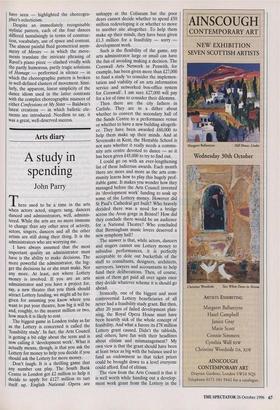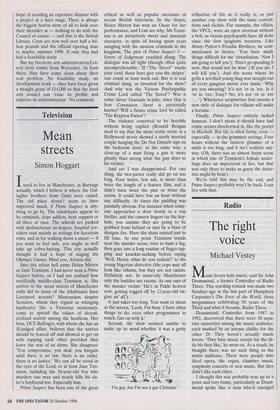Arts diary
A study in spending
John Parry
There used to be a time in the arts when actors acted, singers sang, dancers danced and administrators, well, adminis- tered. While the arts are no more immune to change than any other area of activity, actors, singers, dancers and all the other artists are still doing their thing. It is the administrators who are worrying me. I have always assumed that the most important quality an administrator must have is the ability to make decisions. The more powerful the administrator, the big- ger the decisions he or she must make. Not any more. At least, not where Lottery money is involved. If you are an arts administrator and you have a project for, say, a new theatre that you think should attract Lottery funding, we might all be for- given for assuming you know where you want to put your theatre, how big it will be and, roughly, to the nearest million or two, how much it is likely to cost.
The biggest game in London today as far as the Lottery is concerned is called the `feasibility study'. In fact, the Arts Council is getting a bit edgy about the term and is now calling it 'development work'. What it actually means, though, is that you ask the Lottery for money to help you decide if you should ask the Lottery for more money. Don't laugh. It is a thrilling game that any number can play. The South Bank Centre in London got £2 million to help it decide to apply for £127 million to tart itself up. English National Opera are
unhappy at the Coliseum but the poor dears cannot decide whether to spend £50 million redeveloping it or whether to move to another site altogether. To help them make up their minds, they have been given £1.3 million for a feasibility — sorry development work.
Such is the flexibility of the game, any arts administrator large or small can have the fun of avoiding making a decision. The Cornwall Arts Network in Penwith, for example, has been given more than £27,000 to fund a study `to consider the implemen- tation and viability of an arts information service and networked box-office system for Cornwall'. I am sure £27,000 will pay for a lot of time to consider their dilemma.
Then there are the city fathers in Carlisle. They are in a dither about whether to convert the secondary hall of the Sands Centre to a performance venue or whether to have a new building altogeth- er. They have been awarded £60,000 to help them make up their minds. And at Sevenoaks in Kent, the Hextable School is not sure whether it really needs a commu- nity arts centre devoted to dance — so it has been given £45,000 to try to find out.
I could go on with an ever-lengthening list of these ludicrous awards. Each month there are more and more as the arts com- munity learns how to play this hugely prof- itable game. It makes you wonder how they managed before the Arts Council invented its 'development work' funding to soak up some of the Lottery money. However did St Paul's Cathedral get built? Who bravely decided there was a need for a bridge across the Avon gorge in Bristol? How did they conclude there would be an audience for a National Theatre? Who concluded that Birmingham music lovers deserved a new symphony hall?
The answer is that, while actors, dancers and singers cannot use Lottery money to subsidise performances, it is perfectly acceptable to dole out bucketfuls of the stuff to consultants, designers, architects, surveyors, lawyers and accountants to help fund their deliberations. Then, of course, most of them get paid all over again once they decide whatever scheme it is should go ahead.
Ironically, one of the biggest and most controversial Lottery beneficiaries of all never had a feasibility study grant. But then, after 20 years of failed development plan- ning, the Royal Opera House must have been heartily sick of the whole concept of feasibility. And what a furore its £78 million Lottery grant caused. Didn't the tabloids, and others, have fun with their headlines about elitism and mismanagement? My own view is that the grant should have been at least twice as big with the balance used to fund an endowment so that ticket prices could be brought down to a level everyone could afford. End of elitism.
The view from the Arts Council is that it is well worth while handing out a develop- ment work grant from the Lottery in the hope of avoiding an expensive disaster with a project at a later stage. There is always the biggest horror story of all to look over their shoulder at — nothing to do with the Council of course — and that is the British Library. Costs are now well over half a bil- lion pounds and the official opening date is, maybe, summer 1998. If only they had had a feasibility study .
But my favourite arts administration/Lot- tery story comes from Worcester. At least there, they have come clean about their real problem. No feasibility study, no development work — they have been given a straight grant of £14,000 so that the local arts council can 'raise its profile and improve its administration'. No comment.



















































































 Previous page
Previous page